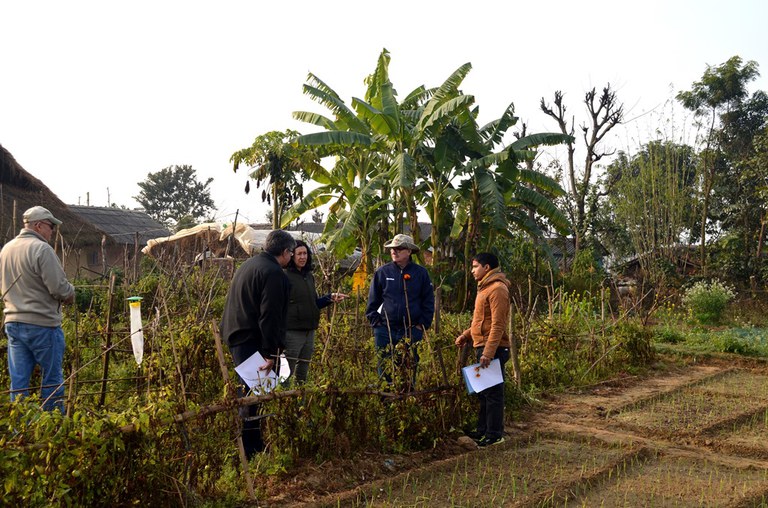Posted: February 7, 2017
Cristina Rosa visited southeast Asia as part of the Asian vegetable and mango IPM IL program.
As Penn State Co-Principal Investigator (PI) in the The Asian vegetable and mango Integrated Pest Management Innovation Lab (IPM IL) program, Dr. Cristina Rosa visited Bangladesh, Cambodia, and Nepal for fifteen days at the end of January. (See PHOTOS)
Drs. Rosa (Co-PI) and Ed Rajotte (PI, Dept. of Entomology) from Penn State traveled with other U.S. team members to evaluate field trials and to organize activities for the upcoming growing seasons in these three recipient countries.
In Bangladesh the team was able to observe:
- field trials to evaluate the performance of Bt and non-Bt eggplant under IPM package;
- a survey on incidence of and pest damage due to tomato leafminer, Tuta absoluta;
- the development of management approach for mango hopper and fruit fly, Bactrocera dorsalis;
- the results of a study on the biology, yield loss, and integrated management of white mold of country bean;
- evaluate the assessment of economic impacts of vegetable IPM in Bangladesh.
In Cambodia the team observed IPM field trials on Chinese Kale and cucumber with cooperating farmers in the Siem Reap districts. Three experiments, including the effects of Trichoderma and pesticides on Chinese kale and cucumber and a Ralstonia solanacearum rootstock-tolerance trial, were completed by a Royal University of Agriculture (RUA) team.
Several experiments, capacity building through graduate student research, were evaluated in Nepal. Activities monitored included:
- the surveillance of pest and disease in okra, chilli, onion, and french beans;
- the monitoring of Tuta absoluta outbreaks and of Helicoverpa and Spodoptera incidence using lures;
- a survey of economic loss and management practices adopted by commercial tomato growers in four districts;
- the management of fruit fly in bitter gourd and cucumber;
- the efficiency evaluation of pest exclusion net for the management of insects in tomatoes;
- the efficacy evaluation of Trichoderma products available in the market;
- graduate student training in economic impact assessment, plant pathology, and gender analysis.
Other research in Nepal includes:
- the identification of Fusarium species associated with rhizome rot disease of ginger, examining the influence of different temperatures, pH, and water activities on Trichoderma isolates;
- studying the effects of carbon sources on anaerobic soil disinfestation to reduce soilborne pests in okra and brinjal;
- identifying effective biocontrol strains from the Nepalese Trichoderma collection.
The Asian vegetable and mango IPM IL program is led by Virginia Tech with Penn State, Ohio State, and Washington State as partners. The program implements ecologically-based, participatory integrated pest management practices in Cambodia, Nepal, and Bangladesh, with a focus on pests and diseases of vegetables and mango (the latter in Bangladesh).
Local partners in the three recipient countries include the Agricultural Research Institute in Bangladesh; International Development Enterprises (iDE), the National Agricultural Research Council (NARC), Agricultural and Forestry University, Himalayan College of Agricultural Sciences and Technology (HICAST), and the Center for Environmental and Agricultural Policy Research, Extension, and Development (CEAPRED) in Nepal; iDE, the General Directorate of Agriculture and the Royal University of Agriculture (RUA) in Cambodia.
Contact Information



